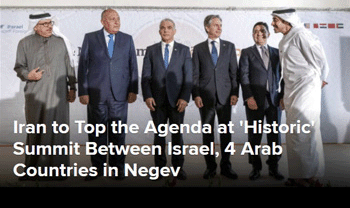03-28-2022 Chris Mitchell
JERUSALEM, Israel – The foreign ministers of four Arab countries joined US Secretary of State Antony Blinken for a historic conference in Israel focused on the development of the Abraham Accords and the mutual threat of Iran.
Israel on Sunday welcomed the foreign ministers of Bahrain, the UAE, Morocco, and Egypt for what is being called the “Negev Summit.” The two-day meeting will take place at the former home and gravesite of David Ben Gurion, the father of modern Israel.
“The fact that they are coming here to be with us, to recognize that Israel is not just here, but Israel is a regional power and is an ally regional power. We’re an essential ally of these Arab states. It’s quite an extraordinary moment,” Former Israeli Ambassador to the US Michael Oren told CBN news.
Oren sees the gathering as history in the making but it also comes as the US is nearing the completion of a renewed Iranian nuclear deal endorsed by US Secretary of State Antony Blinken here in Jerusalem.
“The United States believes that a return to full implementation of the Joint Comprehensive Plan of Action is the best way to put Iran’s nuclear program back in the box that it was in, but has escaped from since the United States withdrew from that agreement,” Blinken told reporters during a press conference on Sunday.
Israel’s Foreign Minister Yair Lapid emphasized Israel will do what it takes to stop Iran.
“Anything. From our point of view, the Iranian threat is not theoretical. The Iranians want to destroy Israel. They will not succeed; we will not let them,” said Lapid.
Oren says the new nuclear agreement is worse than the original.
“The fact is that the Iranians are going to get pretty much everything that they want … they’ll get a nuclear program that will enable them to retain their nuclear infrastructure … to develop an intercontinental ballistic delivery system,” says Oren.
“(The new deal) will probably say nothing about the development of nuclear warheads,” Oren says, adding that after four years, Iran may be in a position to “enrich enough uranium for hundreds of bombs.”
He adds, “I am certain that this deal will put Israel and the Middle East on a path to a regional conflict.”
Oren and other critics say the deal will also give Iran billions of dollars in sanctions relief to spread its terror activities throughout the region. How Israel and these Arab nations at today’s summit plan to confront Iran may well determine the future of the Middle East.
